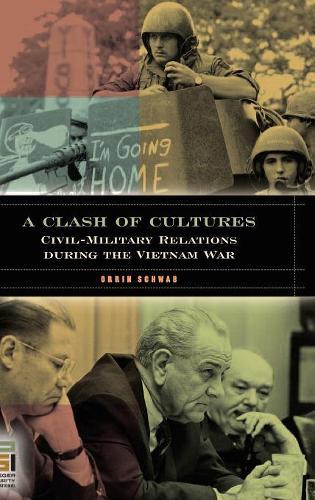
A Clash of Cultures: Civil-Military Relations during the Vietnam War
(Hardback)
Publishing Details
A Clash of Cultures: Civil-Military Relations during the Vietnam War
By (Author) Orrin Schwab
Bloomsbury Publishing PLC
Praeger Publishers Inc
30th August 2006
United States
Classifications
General
Non Fiction
Military history: post-WW2 conflicts
Modern warfare
Asian history
History of the Americas
959.7043
Physical Properties
Hardback
216
Width 156mm, Height 235mm
482g
Description
The Vietnam War was in many ways defined by a civil-military divide, an underlying clash between military and civilian leadership over the conflict's nature, purpose and results. This book explores the reasons for that clashand the results of it. The relationships between the U.S. military, its supporters, and its opponents during the Vietnam War were both intense and complex. Schwab shows how the ability of the military to prosecute the war was complicated by these relationships, and by a variety of nonmilitary considerations that grew from them. Chief among these was the military's relationship to a civilian state that interpreted strategic value, risks, morality, political costs, and military and political results according to a different calculus. Second was a media that brought the warand those protesting itinto living rooms across the land. As Schwab demonstrates, Vietnam brought together two leadership groups, each with very different operational and strategic perspectives on the Indochina region. Senior military officers favored conceptualizing the war as a conventional military conflict that required conventional means to victory. Political leaders and critics of the war understood it as an essentially political conflict, with associated political risks and costs. As the war progressed, Schwab argues, the divergence in perspectives, ideologies, and political interests created a large, and ultimately unbridgeable divide between military and civilian leaders. In the end, this clash of cultures defined the Vietnam War and its legacy for the armed forces and for American society as a whole.
Reviews
"Schwab's argument is broadly convincing and his book is impressive in placing the civil-military clash in a broad context. While civil-military relations are often narrowly conceived as being the relations between those at the very top, Schwab's decision to examine many facets of the relationship is laudable. Therefore this book is invaluable as an introduction to civil-military relations during the ware, and as a basis for further research. It answers some important questions, but it also raises more."-Journal of American Studies
""Two cultures, one grounded in military history and institutions, the other, founded in the political and social milieu of post-Second World War America, diverged over the Vietnam War," argues Schwab in his examination of the evolution of civil-military relations in the American government over the course of the war. This clash between these two ideologies and cultures resulted in a situation where military solutions to the conflict became irreconcilable with political solutions, forcing strategic and operational compromises that led inexorably to defeat for the United States and damage to both the military and wider civilian cultures."-Reference & Research Book News
"Military obedience to civilian authority has been one of the fundamental foundations of US society, a bedrock principle that has never been seriously challenged. Occasionally, in times of war or prelude to war, however, civil-military relations have become strained or adversarial. During the Vietnam War, particularly deep disagreements divided the military from civilian political leaders, the media, and the general public. The dominant military interpretation of Vietnam was and is that militarily unsound civilian decisions and limitations tragically prevented the military from winning a winnable war. Because the US is again in the middle of a contentious, inconclusive conflict that many think resembles the Vietnam War, and because so little of the voluminous military writing and thinking about Vietnam gets wide public notice, this is an important topic....Recommended. All levels/libraries."-Choice
"Two cultures, one grounded in military history and institutions, the other, founded in the political and social milieu of post-Second World War America, diverged over the Vietnam War," argues Schwab in his examination of the evolution of civil-military relations in the American government over the course of the war. This clash between these two ideologies and cultures resulted in a situation where military solutions to the conflict became irreconcilable with political solutions, forcing strategic and operational compromises that led inexorably to defeat for the United States and damage to both the military and wider civilian cultures.-Reference & Research Book News
Military obedience to civilian authority has been one of the fundamental foundations of US society, a bedrock principle that has never been seriously challenged. Occasionally, in times of war or prelude to war, however, civil-military relations have become strained or adversarial. During the Vietnam War, particularly deep disagreements divided the military from civilian political leaders, the media, and the general public. The dominant military interpretation of Vietnam was and is that militarily unsound civilian decisions and limitations tragically prevented the military from winning a winnable war. Because the US is again in the middle of a contentious, inconclusive conflict that many think resembles the Vietnam War, and because so little of the voluminous military writing and thinking about Vietnam gets wide public notice, this is an important topic....Recommended. All levels/libraries.-Choice
Author Bio
Orrin Schwab a visiting scholar at the University of Chicago, is the author of Defending the Free World: John F. Kennedy, Lyndon Johnson and the Vietnam War, 1961-1965 (Praeger, 1998). He has taught at Purdue University Calumet and the University of Chicago.
